The City of Cincinnati is experiencing a critical shortage of affordable and accessible housing. Over 28,770 families in the city have an annual income below $23,000 and pay more than they can afford for a safe and stable home. This has forced thousands of families with children; working adults; and our elders into the trauma of homelessness. Everyone deserves access to the security of a home, and we all deserve space to grow into our highest potential. The problem is real. Now let’s talk solution.
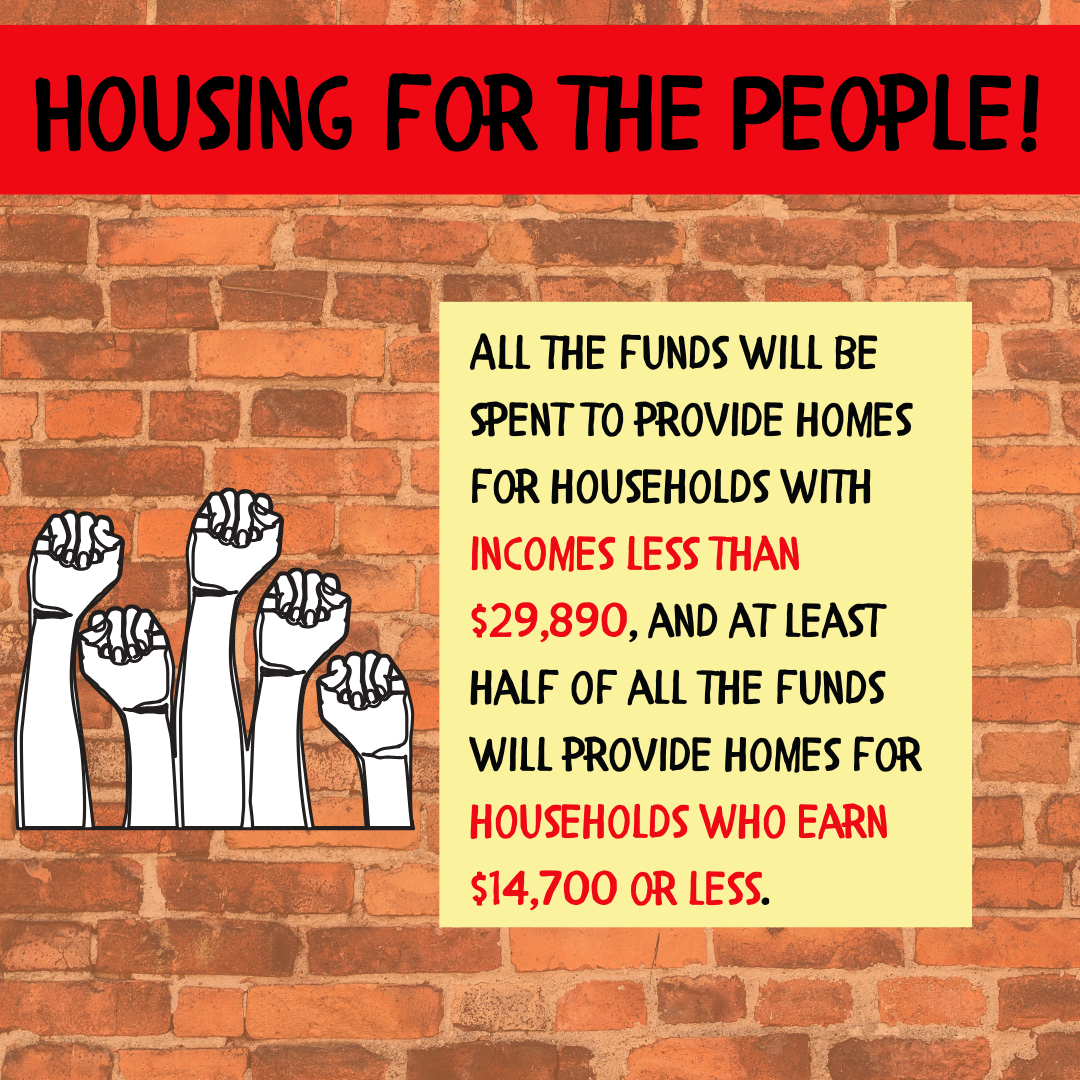
This trust fund will help build and maintain housing for workers, seniors, and families who are currently competing for overpriced, market rate apartments. We are focused on housing for people who earn less than $30,000 per year, with special attention on affordability for our community members who earn less than $15,000.

Ninety-five percent of the Funds will be invested in the community mostly for projects like capital development, with a small amount available for direct services. Capital developments include restoring some of the currently existing but outdated housing, and building new infrastructure.
Best of all, the projects that receive money through this trust fund will stay affordable forever. Additionally, anyone hired to construct, operate, or renovate any units that are supported through this funding must be paid a living wage consistent with Cincinnati’s current living wage ordinance. No more pro-gentrification loopholes!
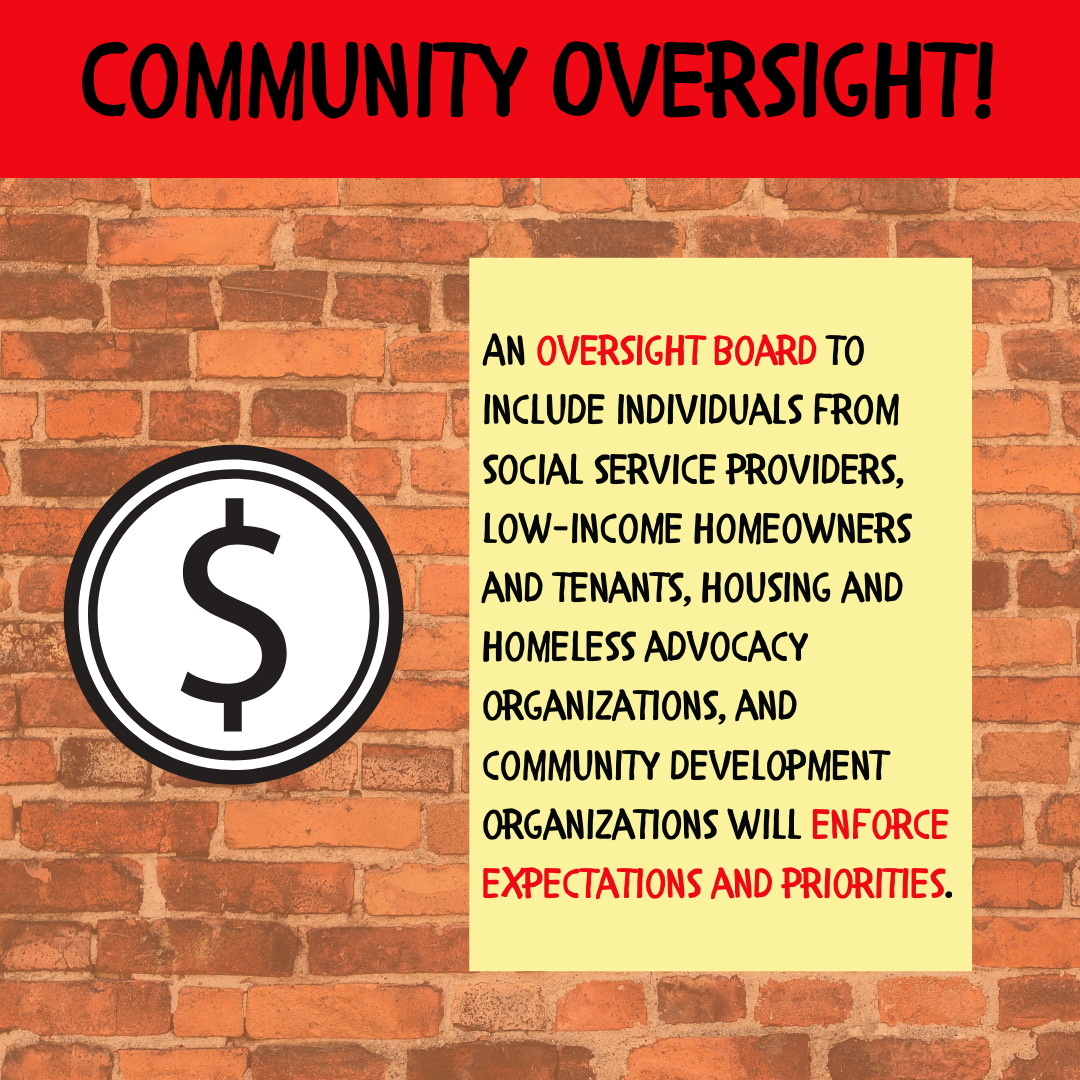
A Housing Trust Fund Board will enforce accountability and oversight of spending. This all-volunteer, 11-member board will include both professional housing advocates, and individuals who have experienced housing instability. It’s a community movement that will change our city’s landscape in a positive way!

Volunteer opportunities are available.
Questions? Contact Amanda Lynn Barker at amandabarker@cincihomeless.org
______________________________________________________

______________________________________________________
City of Cincinnati Affordable Housing Trust Fund
White Paper
Housing_Affordability_Hamilton_County (Xavier Community Building Institute & Local Initiatives Support Corp. Report)
Purpose: The City of Cincinnati Affordable Housing Trust Fund is a continuing, non-lapsing fund to be used to:
- develop and preserve affordable housing for renters and homeowners,
- promote fair housing in neighborhoods throughout Cincinnati, and
- increase affordable housing opportunities for low-income working families and other persons of low income.
Background: There is a critical shortage of affordable and accessible housing in the City of Cincinnati. Over 28,770 households in the city have an annual income below $23,000, but pay more than 30% of their income on housing. More than half of the homes in Cincinnati were built before 1960 and researchers estimate that we need at least 18,000 more affordable housing units to provide enough affordable units for those that need it.
Income Limits: Rental and homeownership housing projects and activities that serve households up to 61% of the current area median income (AMI). At least 50% of the Trust Fund Resources must be spent on affordable housing for households with incomes between 0-30% of the current AMI. All housing units receiving support from the Affordable Housing Trust Fund must be affordable to households with an income below 61% of the current AMI.
What is the Affordable Housing Trust Fund established to do: Specific purposes are listed in the City Ordinance:
- Providing assistance, by loan, grant, operating subsidy, or otherwise, for the planning, production, maintenance, or expansion of affordable housing, including inclusionary housing. This could include support to rehabilitate vacant and abandoned housing in neighborhoods or other specific goals the City would like to achieve;
- Providing predevelopment activities for the acquisition, development, new construction, rehabilitation, and/or restoration of affordable housing;
- Providing affordable and fair housing-related services to low income households to assist them in obtaining housing and remaining stably housed;
- Providing administrative and planning costs for the operation of the Trust Fund provided such uses do not exceed 12% of the funds allocated each fiscal year.
How will the Affordable Housing Trust Fund be Administered: The Ordinance specifies that the Affordable Housing Trust Fund (AHTF) will be administered by Department of Economic and Community Development (The Department) with oversight from an appointed nine-member Oversight Board. The Oversight Board will work with The Department to determine and outline detailed parameters for effective administration of the Fund.
The Ordinance states that the Oversight Board shall review standards, policies, and goals for the Affordable Housing Trust Fund established by City staff, consistent with the purposes and policies set forth in the ordinance, including without limitation criteria for eligible projects, number and type of units funded, and scoring of applications for funding. This Oversight Board also has responsibility to approve or modify said standards and policies.
Based on the experience of successful housing trust funds across the country, the administration of the Affordable Housing Trust Fund will include:
- Release a Notice of Funding Availability (NOFA) at least twice per year as well as a Request for Proposals (RFP) at least once per year. Additional NOFAs and RFPs may be released at any time per the discretion of the Oversight Board.
- Ensure the activities of the Affordable Housing Trust Fund must meet the basic parameters outlined in the Ordinance and comply with all applicable city, state, and federal
- Hold a Think Tank gathering at least twice a year open to all Residents of housing currently or formerly supported with Trust Fund Resources. The purpose of these gatherings will be for Residents to provide feedback on the conditions of the property, the professionalism of staff and the following of property management procedures.
How Will the Affordable Housing Trust Fund be Funded: The goal of this Ordinance was to provide ample flexibility and enable as many options for committing on-going funding to the Affordable Housing Trust Fund. The goal is for the Trust Fund to generate at least $30 million annually. Loans, grants or allocations from the City or State are permitted. For example, the Mayor can place general fund dollars into the Trust Fund; The City Council can create dedicated funding sources and direct them into the Trust Fund; tax increment financing (TIF) proceeds can go into the Trust Fund.
It is imperative for the Affordable Housing Trust Fund to have both capital and operating funding.
We are advocating for the Trust Fund to have a variety of dedicated public revenue sources, including but not limited to:
- A percentage of the earning’s tax;
- Voluntary payments into the Fund in exchange for property tax abatements;
- An entertainment tax which could be associated with sporting events, concerts, restaurants, bars, etc.;
- A percentage of the hotel tax;
- Impact fees required for the zoning and permitting approval of market rate developments (likely a dollar amount per square foot);
- Linkage fees required for the zoning and permitting approval of market rate developments. These are meant to make it such that people working in these market rate spaces can afford to live nearby;
- Taxing stock options (Fortune 500 and 1000 CEOs and other upper management are often paid much of their salary in stock options, which currently the City does not tax at all);
- Proceeds from the sale of public land;
Allocation from the General Fund
Affordable Housing Advocates
Affordable Housing Advocates (AHA)– also known as Cincinnatians for Affordable Housing– is a group of housing providers, advocates and consumers dedicated to the goal of ensuring good, safe, accessible, affordable housing for all people in Southwest Ohio.
Our focus is on meeting the housing needs of very low, low, and moderate-income individuals and families. This group formed to share the expertise and information gathered by its members over decades of service to the Greater Cincinnati community in the area of affordable housing and to initiate and support plans of action that will further the creation, retention and accessibility of affordable housing in our community.
We are a diverse group of advocates, spanning the grassroots, faith-based, development and planning communities. For a list of our members and advisors, view the membership page.
Membership Meetings are held the Fourth Tuesday of each month at noon. Meetings are open to the public. For information, contact us.
Housing Affordability in Hamilton County
In Cincinnati and Hamilton County it is increasingly difficult for low-income families to find quality affordable homes. Today there is an estimated deficit of 40,000 housing units that are affordable and available to extremely low income households, those making less than $14,678. On top of this, more than 7,500 additional households experience some form of homelessness in Cincinnati and Hamilton County (The Partnership Center, 2015). Most of these extremely low income households spend significantly more on housing than what is considered affordable, 30% or less of gross income. Many of us face difficult choices as we allocate our limited household resources, but households at the bottom of the income spectrum, with such a limited budget, are forced to make decisions between many essentials such as food, healthcare, and transportation. Households that come up short may move, get evicted, remain in housing in very poor condition, or crowd into homes that are too small. All of this puts stress on families, likely rippling out through our housing market and spilling over into labor and employer issues, education, and health care.
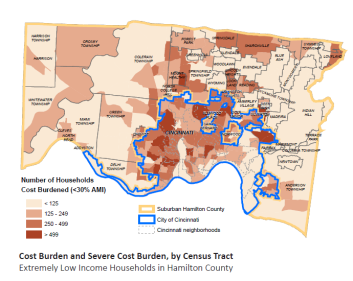 Cincinnati and Hamilton County are collectively considered a relatively affordable housing market, but it is not affordable for everyone. For a growing number of people living below Hamilton County’s median income ($48,927 in 2014) a decent home is not affordable. The foreclosure crisis of the late 2000s has left its mark; fewer new housing units are being built each year (1,000 less in 2015 than in 2000) and what is being built is more expensive. The average construction cost for a new single- or two-family unit in Hamilton County has grown by 31% since 2000, and for an apartment or condo in a multi-family building the per-unit cost has grown by 50%. Meanwhile, the median income in Hamilton County has only grown by 19% and the poverty rate has jumped by 43%. As the average cost of building housing goes u
Cincinnati and Hamilton County are collectively considered a relatively affordable housing market, but it is not affordable for everyone. For a growing number of people living below Hamilton County’s median income ($48,927 in 2014) a decent home is not affordable. The foreclosure crisis of the late 2000s has left its mark; fewer new housing units are being built each year (1,000 less in 2015 than in 2000) and what is being built is more expensive. The average construction cost for a new single- or two-family unit in Hamilton County has grown by 31% since 2000, and for an apartment or condo in a multi-family building the per-unit cost has grown by 50%. Meanwhile, the median income in Hamilton County has only grown by 19% and the poverty rate has jumped by 43%. As the average cost of building housing goes u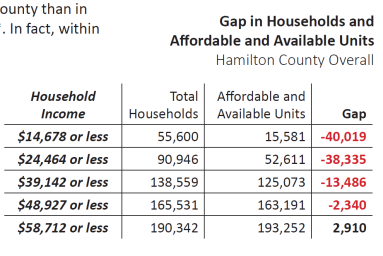 p and the number of units declines, household income is not keeping pace and more of us pay a larger share of our income for housing.
p and the number of units declines, household income is not keeping pace and more of us pay a larger share of our income for housing.
There are tools available for us to address the affordable housing gap, but the existing programs have been underfunded. There are approximately 25,300 HUD-subsidized housing units available in Hamilton County, which is 500 units fewer than what was available in 2000. Yet today there are 16,000 more households in poverty that struggle to find affordable housing options. While the need for affordable housing is increasing and the publicly subsidized supply is largely unchanged, the ways we deliver subsidies for housing are changing. For generations, affordable housing built with public funds was part of the public housing system managed by metropolitan housing authorities and later, private site-based operators. In the last forty years, especially with the creation of the Housing Choice Voucher and Low Income Housing Tax Credit, more public subsidies for housing are channeled through private landlords. In many examples, these programs work well and provide quality units and more choice to tenants. In other cases, especially under the voucher program, unscrupulous landlords can earn steady cash income while renting poor quality units and leaving tenants with few options.
If we want families to move out of poverty and create better lives for themselves and their children, we should start by ensuring that everyone has a decent and stable place to call home. This might mean households are making more money and so are able to afford better housing, and that more quality housing units are available at lower rents. Overall, approximately 40,000 more housing units targeted to people of very low incomes are needed in Hamilton County to meet current demand. This affordable housing provides stability: an address for a job application, a place for children to study at night, a steady set of neighbors that offer support —just the things that families in Cincinnati have taken into account for generations when they say, “this is a great place to raise a family.” As our region continues to enjoy increased prosperity, we have an opportunity and an obligation to ensure that all of our neighbors share in the benefits of growth.
FUND 439: Affordable Housing Trust Fund
BE IT ORDAINED by the Council of the City of Cincinnati, State of Ohio;
Section 1. That the Director of Finance is hereby authorized to establish a new special revenue fund, Fund 439, “Affordable Housing Trust Fund,” (the “Affordable Housing Trust Fund”) for the purpose of receiving and disbursing funds to preserve and develop affordable housing and prevent homelessness in the City of Cincinnati and any of the City of Cincinnati’s administrative costs associated therewith. All individuals or entities receiving funds from the Affordable Housing Trust Fund must use such funds to benefit households with a household income below 61% of the Area Median Income and, if applicable, have rental policies with no categorical discrimination, included but not limited to race, color, sex, nationality, religion, marital status, sexual orientation, familial composition, economic class, criminal background, homelessness or ability. Half of all such funds in the Affordable Housing Trust Fund must benefit households with a household income at or below 30% of the Area Median Income.
Section 2. That it is City Council’s intent that a separate ordinance be passed that establishes (i) a revenue source for the Affordable Housing Trust Fund and (ii) eligibility requirements for the receipt of funds from the Affordable Housing Trust Fund and an oversight board that will notify the public of existing funds available from the Affordable Housing Trust Fund, enforce funding priorities and eligibility requirements, and recommend funding recipients to City Council.
| Calendar Date: | 12/12/2018 | ||||
| Sponsors: | BUDGET AND FINANCE COMMITTEE | ||||
| Status | PASS | ||||
| Description: | ORDINANCE, submitted by Councilmember Mann from Paula Boggs Muething, City Solicitor on 11/29/2018, ESTABLISHING new special revenue fund, Fund 439, “Affordable Housing Trust Fund,” for the purpose of receiving and disbursing funds to preserve and develop affordable housing and prevent homelessness in the City of Cincinnati and to find any of the City of Cincinnati’s administrative costs associated therewith. | ||||
| Final Disposition: | PASSED | ||||
| Ordinance#: | 0364-2018 | ||||
| Votes: | MR. SEELBACH MR. SITTENFELD MR. SMITHERMAN MR. YOUNG MS. DENNARD MR. LANDSMAN MR. MANN MS. MURRAY MR. PASTOR |
Final Y Y Y Y Y Y Y A Y 12/12/2018 |
Ordinance Y Y Y Y Y Y Y A Y 12/12/2018 |
||
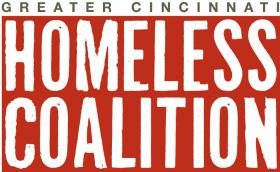


You must be logged in to post a comment.